Is Shockwave treatment effective for Erectile dysfunction?
In current society, erectile dysfunction (ED) is a common issue. It is more common in older people and people who are at risk for cardiovascular disease. The two primary therapy options for these patients are intravenous/intra-urethral alprostadil and oral 5-phosphodiesterase inhibitors (PDE5-I). Despite the positive outcomes of these strategies, non-responders are left without any other reasonable options.
One of the several treatments for erectile dysfunction is shockwave therapy (ED). Though the Food and Drug Administration (FDA) has not approved it, multiple studies that produced positive findings have supported the science behind this pill-free treatment.
People with vasculogenic ED, a blood vessel condition that affects blood flow to the tissue in the penis, seem to respond best to shockwave therapy. We are still uncertain of the therapy’s effectiveness with other ED reasons.
Shockwave Therapy

Recent years have seen the emergence of several cutting-edge solutions to this issue, and experiments using low-intensity extracorporeal shockwave therapy (Li-ESWT). It is applicable in the corpora cavernosa which have produced promising results.
It’s a harmless treatment that has long been utilised in orthopaedics to aid in the recovery of tendons, ligaments, and shattered bones. Additionally, LiESWT has been utilised to enhance wound healing. LiESWT has the ability to accelerate cell development and tissue repair by using focused high-energy sound waves.
Healthy blood flow to the penile tissue is necessary for erections. Shockwave therapy is regarded favourable method of promoting blood flow and rebuilding and fortifying blood vessels in the penis.
The purpose of more conventional ED treatments, such as oral drugs like sildenafil (Viagra) and tadalafil, is to improve blood flow to the penis (Cialis).
How does it work?
A pen-like device is used to deliver shockwave therapy close to certain penile regions. For roughly 15 minutes, a medical practitioner moves the device over various penile regions while it sends out moderate pulses. Anesthesia is not required.
The pulses cause the penis’s tissue to restructure and its blood flow to improve. These two adjustments can produce erections strong enough for sexual activity. There is presently no accepted recommendation for the length of time or frequency of treatment.
But according to a study and meta-analysis of clinical studies published in 2019, the most popular treatment schedule was twice weekly treatments for 3 weeks, followed by 3 weeks without therapies and another 3 weeks of twice weekly treatments. According to the research, shockwave therapy’s effects lasted for about a year.
Shockwave Therapy Candidate
It is not yet known who might benefit from shockwave therapy the most, similar to other off-label medical equipment. Theoretically, everyone dealing with chronic ED could be a candidate, but according to recent study, vasculogenic ED may benefit the most.
Studies on this topic are conflicting, however. While some studies indicated that shockwave therapy was most beneficial in cases of moderate to severe ED when used in alongside other treatments, other studies showed the opposite.
Talking with your doctor about your case is the best approach to find out if you qualify for this ED treatment, especially if you haven’t had luck with other treatments.
What about research?
The same 2019 research and meta-analysis discovered that shockwave therapy significantly improved erectile function. The best outcomes were seen in vasculogenic ED-positive individuals.
In a pilot trial conducted in 2010, it was discovered that after receiving shockwave therapy for six months, all 20 of the males with vasculogenic ED had improved erectile function. Following up with the males indicated no negative outcomes.
The Food and Drug Administration (FDA) has not yet approved shockwave therapy as a treatment for ED, despite this promising evidence. Shockwave therapy for ED may still be prescribed by some doctors, although doing so outside of a study environment is off-label.
New therapies that receive FDA approval are always associated by instructions for use and warnings about potential negative effects for patients.
Side effects
For most men, shockwave therapy is painless. And as was already mentioned, the study that is currently accessible has identified minimal, if any, negative effects.
That does not, however, imply that the surgery is risk-free. As a relatively novel medication, more investigation is required to ascertain its adverse effects, problems, and long-term efficacy.
Shockwave therapy costs
Shockwave therapy is a non-FDA-approved off-label ED treatment, therefore medical insurance is unlikely to pay for it. With an average of $450 each session, the precise fees may differ depending on the service and area.
So, if a doctor advises a twice-weekly schedule for three weeks at a time, the fees may perhaps total around $2,700.
However, you might be able to find ways to lower the cost of your treatment by collaborating with your provider. Discounted bundle prices and monthly payment plans are two alternatives.
REFERENCES:
- https://www.mazemenshealth.com/blog/low-intensity-shock-wave-therapy-li-ewst-is-effective-for-moderate-erectile-dysfunction-ed
- https://www.ncbi.nlm.nih.gov/pmc/articles/PMC3607492/
- https://www.healthline.com/health/shockwave-therapy-for-ed
- https://healthcare.utah.edu/menshealth/conditions/erectile-dysfunction/shockwave-therapy.php
- https://amj.amegroups.com/article/view/5066/html
For more details, kindly visit below.
